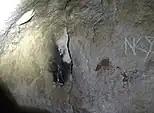< Reconstruction:Proto-Indo-European
Reconstruction:Proto-Indo-European/kr̥snós
Proto-Indo-European
Etymology
From *kers- + *-nós or *ker-s- + *-nós. Compare Proto-Celtic *dusnos (“dark, brown”) (see also *dubus (“black”) and *dubnos (“deep; world”)).
Possibly related words:
- Lithuanian kéršas (“with black/white spots/patches”), kéršė (“pied cow”) and kiršlỹs (“grayling”)
- Swedish harr (“grayling”) < Proto-Germanic *harzuz.[1] See also Proto-Finnic *harjus (“grayling”).
- Bulgarian чер (čer, “black”) < *черх (*čerh) like вет (vet) < ветх (veth), if not shortened from черен (čeren, “black”).
- In 3+2 anthroponyms: Thracian *kersas.
- River name: Hungarian Körös (“Criș”), Fekete-körös (“Crișul Negru”).
- Probably unrelated to Proto-Turkic *kara (“black”) and other similar words.[2]
Compare "black" (absorbing/without light) names:
- burn (soot/char/tan): (*dʰegʷʰ-) Lithuanian dègti (“to burn”) : dãglas (“fire/burn-colored?”), dẽglas (“black-piebald?”)[3], (*gʷʰer-) Serbo-Croatian gȃr (“ashes, cinder”) : gȁrav (“soot-colored, black”),[4] Slovene čad (“smoke/fume, haze”) : čadeti (“to become smoke-like, blackish”),[5] (?*(s)mewg-) Old East Slavic смага (smaga, “fire, flame”) : Russian Church Slavonic смаглъ (smaglŭ, “dark-skinned”).[6]
- See also *kerh₃- (“to burn”),[7] *wer- (“to burn”), *dʰewh₂- (“smoke?”), *h₁óngʷl̥ (“charcoal”), *h₂eh₁ter- (“fire”) and Proto-Dravidian *kār.
- dirt/spot: (*melh₂-/*mel-) Ancient Greek μέλας (mélas, “dark, black”) : Sanskrit मल (mala, “dirt, filth, dust”),[8] Latvian īls (“very dark (pitch-dark)”) : Ancient Greek ἰλύς (ilús, “mud, slime”),[9] (*swerd-) Old High German swarz (“black”) : Latin sordēs (“dirt, filth”).[10]
- dark: *(s)ḱeh₃-, *temH-, *merk-/*merHk-, *h₂mergʷ-/*mergʷ-, *h₁regʷ-, ?*dʰewbʰ-.
Inflection
| Thematic | |||
|---|---|---|---|
| masculine | feminine | ||
| nominative | *kr̥snós | *kr̥snéh₂ | |
| genitive | *kr̥snósyo | *kr̥snéh₂s | |
| masculine | singular | dual | plural |
| nominative | *kr̥snós | *kr̥snóh₁ | *kr̥snóes |
| vocative | *kr̥sné | *kr̥snóh₁ | *kr̥snóes |
| accusative | *kr̥snóm | *kr̥snóh₁ | *kr̥snóms |
| genitive | *kr̥snósyo | *? | *kr̥snóHom |
| ablative | *kr̥snéad | *? | *kr̥snómos |
| dative | *kr̥snóey | *? | *kr̥snómos |
| locative | *kr̥snéy, *kr̥snóy | *? | *kr̥snóysu |
| instrumental | *kr̥snóh₁ | *? | *kr̥snṓys |
| feminine | singular | dual | plural |
| nominative | *kr̥snéh₂ | *kr̥snéh₂h₁(e) | *kr̥snéh₂es |
| vocative | *kr̥snéh₂ | *kr̥snéh₂h₁(e) | *kr̥snéh₂es |
| accusative | *kr̥snā́m | *kr̥snéh₂h₁(e) | *kr̥snéh₂m̥s |
| genitive | *kr̥snéh₂s | *? | *kr̥snéh₂oHom |
| ablative | *kr̥snéh₂s | *? | *kr̥snéh₂mos |
| dative | *kr̥snéh₂ey | *? | *kr̥snéh₂mos |
| locative | *kr̥snéh₂, *kr̥snéh₂i | *? | *kr̥snéh₂su |
| instrumental | *kr̥snéh₂h₁ | *? | *kr̥snéh₂mis |
| neuter | singular | dual | plural |
| nominative | *kr̥snóm | *kr̥snóy(h₁) | *kr̥snéh₂ |
| vocative | *kr̥snóm | *kr̥snóy(h₁) | *kr̥snéh₂ |
| accusative | *kr̥snóm | *kr̥snóy(h₁) | *kr̥snéh₂ |
| genitive | *kr̥snósyo | *? | *kr̥snóHom |
| ablative | *kr̥snéad | *? | *kr̥snómos |
| dative | *kr̥snóey | *? | *kr̥snómos |
| locative | *kr̥snéy, *kr̥snóy | *? | *kr̥snóysu |
| instrumental | *kr̥snóh₁ | *? | *kr̥snṓys |
Descendants
References
- Vasmer, Max (1964–1973) “хариуз”, in Oleg Trubachyov, transl., Этимологический словарь русского языка [Etymological Dictionary of the Russian Language] (in Russian), Moscow: Progress
- Dolgopolsky, Aharon (2008) “1155. *ḲarhA 'black'”, in Nostratic Dictionary, Cambridge: McDonald Institute for Archaeological Research, page 1101
- Pokorny, Julius (1959) “dhegu̯h-”, in Indogermanisches etymologisches Wörterbuch [Indo-European Etymological Dictionary] (in German), volume 1, Bern, München: Francke Verlag, page 240
- Pero Budmani, editor (1887-1891), “gȁrav”, in Rječnik hrvatskoga ili srpskoga jezika (in Serbo-Croatian), volume 3, Zagreb: JAZU, page 105
- Maks Pleteršnik, editor (1894), “čadẹ́ti”, in Slovensko-nemški slovar (in Slovene), volume 1, Ljubljana: Knezoškofijstvo, page 92
- Sreznevsky, Izmail I. (1912) “смаглꙑи”, in Матеріалы для Словаря древне-русскаго языка по письменнымъ памятникамъ [Materials for the Dictionary of the Old East Slavic Language Based on Written Monuments] (in Russian), volumes 3 (Р – Ꙗ и дополненія), Saint Petersburg: Department of Russian Language and Literature of the Imperial Academy of Sciences, column 443
- Pokorny, Julius (1959) “3. ker(ə)-”, in Indogermanisches etymologisches Wörterbuch [Indo-European Etymological Dictionary] (in German), volume 2, Bern, München: Francke Verlag, page 571
- Pokorny, Julius (1959) “6. mel-, melə-”, in Indogermanisches etymologisches Wörterbuch [Indo-European Etymological Dictionary] (in German), volume 2, Bern, München: Francke Verlag, page 720
- Pokorny, Julius (1959) “īl-, īlu-”, in Indogermanisches etymologisches Wörterbuch [Indo-European Etymological Dictionary] (in German), volume 2, Bern, München: Francke Verlag, page 499
- Pokorny, Julius (1959) “su̯ordo-s”, in Indogermanisches etymologisches Wörterbuch [Indo-European Etymological Dictionary] (in German), volume 3, Bern, München: Francke Verlag, page 1052
Further reading
- Mallory, J. P., Adams, D. Q., editors (1997), “black”, in Encyclopedia of Indo-European culture, London, Chicago: Fitzroy Dearborn Publishers, page 69
- Trubachyov, Oleg, editor (1977), “*čьrnъ(jь)”, in Этимологический словарь славянских языков [Etymological dictionary of Slavic languages] (in Russian), numbers 4 (*čaběniti – *děľa), Moscow: Nauka, page 156
- Chernykh, P. Ja. (1993) “чёрный”, in Историко-этимологический словарь русского языка [Historical-Etymological Dictionary of the Russian Language] (in Russian), 3rd edition, volumes 2 (панцирь – ящур), Moscow: Russian Lang., →ISBN, page 383
- Vasmer, Max (1964–1973) “чёрный”, in Oleg Trubachyov, transl., Этимологический словарь русского языка [Etymological Dictionary of the Russian Language] (in Russian), Moscow: Progress
- Pokorny, Julius (1959) “kers-”, in Indogermanisches etymologisches Wörterbuch [Indo-European Etymological Dictionary] (in German), volume 2, Bern, München: Francke Verlag, page 583
- Pokorny, Julius (1959) “6. ker- und k̑er-”, in Indogermanisches etymologisches Wörterbuch [Indo-European Etymological Dictionary] (in German), volume 2, Bern, München: Francke Verlag, page 573
This article is issued from Wiktionary. The text is licensed under Creative Commons - Attribution - Sharealike. Additional terms may apply for the media files.


_Skarpa_w_Mi%C4%99dzybrodziu.jpg.webp)
.jpg.webp)
_-_geograph.org.uk_-_2979191.jpg.webp)
